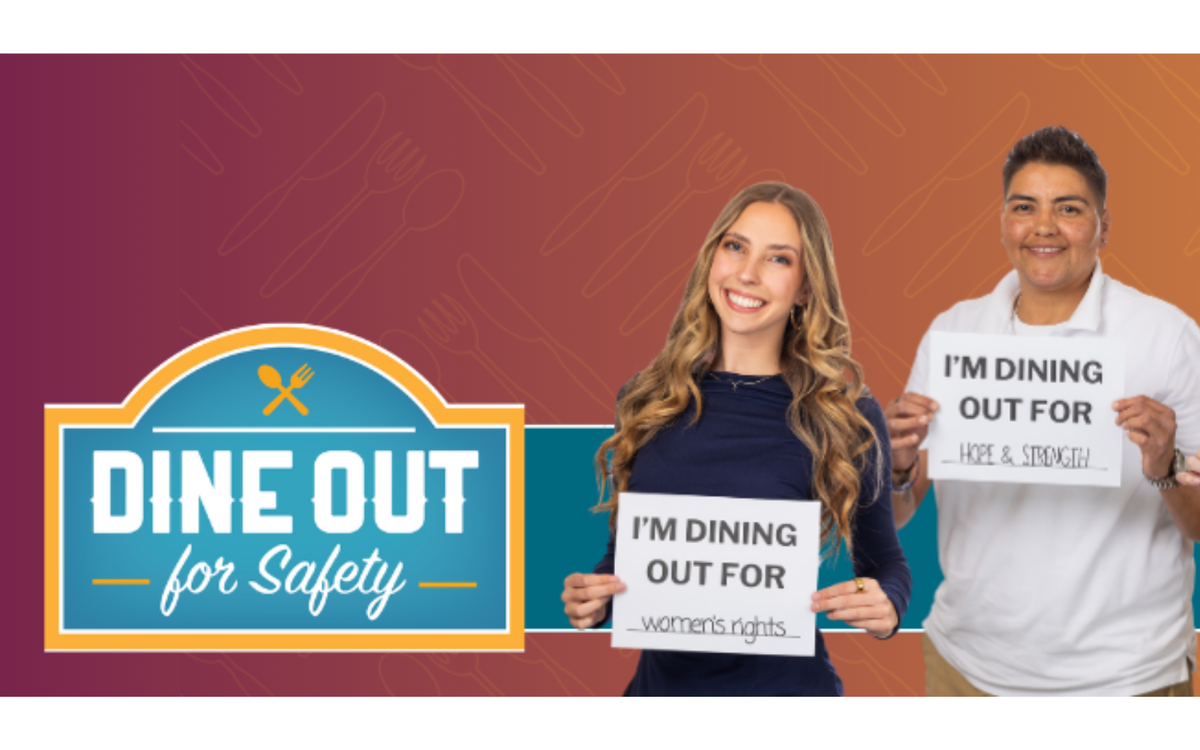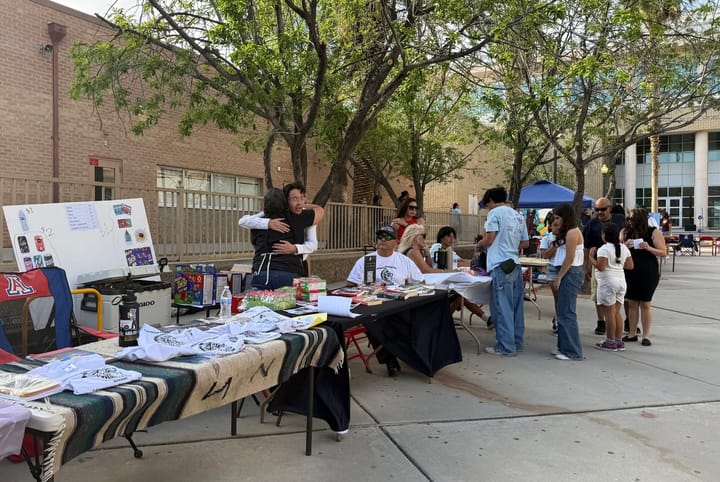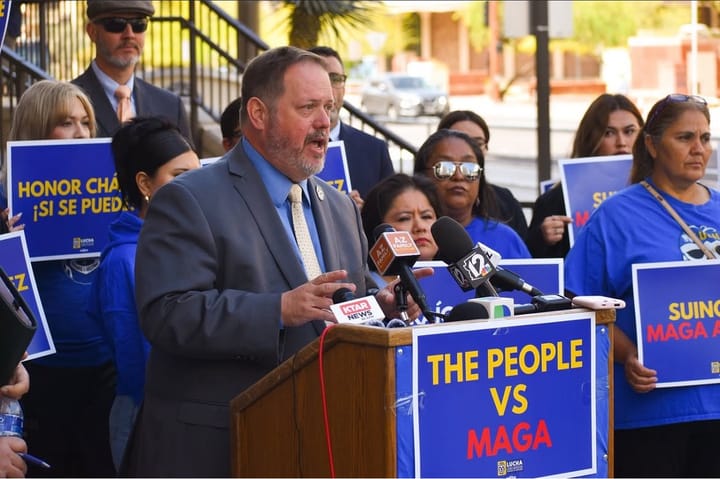Tucson restaurants rally for survivors at Dine Out for Safety
Tucson’s Dine Out for Safety returns Wednesday with 23 restaurants donating a portion of proceeds to support survivors of sexual violence through SACASA.

On Wednesday, restaurants across Tucson will turn every meal into a statement of solidarity, raising funds for the Southern Arizona Center Against Sexual Assault and amplifying support for survivors in a time of shrinking resources and rising need.
Dine Out for Safety returns for its 26th year, with 23 restaurants donating up to 20% of their proceeds from the day to SACASA, helping to fund the center’s services, which include crisis response, advocacy, support and education.
More than 100 volunteers will assist with the event, posted up in participating restaurants to sell raffle tickets and provide information about SACASA.
SACASA was founded in 1973 by local women who wanted to serve victims of sexual violence. Known then as the Coalition of Women’s Agencies, the group’s organizing efforts led to the creation of the first volunteer-run 24-hour sexual assault crisis line in Tucson and, a few years later, the Tucson Rape Crisis Center.
In 2015, SACASA was integrated into CODAC Health, Recovery and Wellness, a collaborative network that serves the varying needs of victims, including primary care, psychiatric care and substance use treatment.
SACASA Director Katlyn Monje has been working with the center for more than six years. She has a background in social work and previously worked at the VA and in the city’s Ward 1 office under then-Councilwoman Regina Romero.
“I fell into SACASA and then realized this is where I need to be, serving survivors,” Monje told Tucson Spotlight. “I really value what I get to do here.”

In 2023, SACASA served more than 1,600 unique survivors of sexual violence, with that number increasing to 1,800 the following year. More than one-third of these survivors first connected with SACASA while in the emergency room.
“One of our main roles at SACASA is to put power and control back in the hands of survivors,” Monje said. “(When) a survivor presents to the hospital completely unsure of what to do, we get there and are able to establish safety and rapport, (and) help them explore their options. We see this transformation that happens, where they start to go into a mode of empowerment, where they realize that what happened to them was not their fault.”
The Rape, Abuse & Incest National Network (RAINN) reports that sexual violence crimes are the most underreported, with more than two-thirds of cases going unreported.
SACASA serves members of the community regardless of age, gender or immigration status and is able to provide additional support through collaborations with other organizations, including the Southern Arizona AIDS Foundation, Latin American consulates and more.
“Healing and justice look different for everyone, so we have to have a robust kind of partnership with various agencies so that we can meet the diverse needs of our diverse survivors,” Monje said.
With the recent executive order to dismantle the Department of Health and Human Services’ Sexual Violence Prevention Division, grant funding has become harder to access, Monje said.
But given the cost to survivors, Monje said the group is committed to providing services for free.
“The average lifetime cost (for) a victim of sexual assault is over $120,000, considering medical bills, missed work and relocation,” Monje said. “We want to make sure that all of our services are easily accessible and free of charge, so that's not one of the burdens (victims) face. We don't bill insurance or charge survivors for the services we provide, and the reason for that is what happened to them never should have happened.”

The Victims of Crime Act, a federal law that provides grant funding for programs that aid victims of crime, took a 40% cut during the 2024 fiscal year.
xfoCommunity organizations like SACASA are preparing for even deeper cuts in upcoming years, which is one of the reasons events like Dine Out for Safety are so important.
Luckily, there’s plenty of support among the local restaurant community.
“One of our values is being a member (of) the community and integrating with the community,” said Yellow Brick Coffee owner David Perreira. “We have the ability to spread awareness and also spread the word and be a beacon.”
Gourmet Girls Gluten Free Bakery/Bistro is also community-oriented. With previous collaborations with the Ronald McDonald House, Rincon Rotary Club and ALS Arizona’s Bite Nite, partnerships have become a staple of the restaurant.
“Tucson is a special place,” said Gourmet Girls server Jennifer Kay. “There's far more collaboration amongst small businesses and nonprofits to really try and make our city and our area better, and it's just a joy and an honor to be part of it.”
Gailee Apple, assistant general manager at The Monica, said the restaurant’s parent company, Si Charro, has been a part of these efforts from the very beginning.
“Our company has been a part of Dine Out for Safety since it started. Family is one of the most important things to this company and all the people that work here. We all treat each other like family,” Apple said. “It’s really important to promote awareness and safety for not only the community, but for our families, our coworkers, our employees, everybody.”

Vero Amore General Manager Darin Osenberg has been the driving force behind collaborations to raise funds for Hermitage Cat Shelter and other groups. This year, the restaurant will participate in the Vecino Block Party benefiting El Rio Health Center’s Cancer Prevention, Screening and Treatment Program.
Osenberg said his philanthropy stems from a desire to put kindness into action.
“Good humans are always trying to help other good humans,” he said. “Anytime we can help from small, medium or large, we're going to do it. I'm very proud to work here.”
In addition to grabbing a meal from one of the 23 participating restaurants on Wednesday, community members wanting to support SACASA can also purchase raffle tickets for the chance to win dozens of prizes.
The grand prize winner will receive a $50 gift certificate to every participating restaurant, valued at more than $1,100.
Other ways to help include volunteering and calling out problematic behaviors that have been normalized through rape culture, Monje said.
“Sexual assault has really thrived in silence, and we want support to be louder than that,” she said. “We want to overshadow the victim blaming and shaming that happens in society. We want solidarity to be the loudest thing that survivors see from their community.”
When: Wednesday, April 16; 7 a.m. to 11 p.m.
Where: 23 restaurants across Tucson
Find more information at sacasa.org/dine-out-for-safety/
Topacio “Topaz” Servellon is a freelance journalist out of Tucson. Contact them at topacioserve@gmail.com.
Tucson Spotlight is a community-based newsroom that provides paid opportunities for students and rising journalists in Southern Arizona. Please support our work with a paid subscription.




